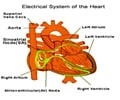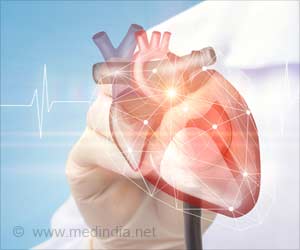AI-driven neural networks enhance disease diagnosis by analyzing medical data for faster, more accurate detection.

Near-term prediction of sustained ventricular arrhythmias applying artificial intelligence to single-lead ambulatory electrocardiogram
Go to source). Each year, sudden cardiac death is responsible for over 5 million deaths worldwide. Many of these cardiac arrests occur out of the blue with no identifiable warning signs, striking individuals from the general population who do not always have a known history of heart disease.
‘Imagine #AI that could foresee a fatal #heartrhythm. Studies are looking into how AI might anticipate #arrhythmias. #hearthealth’





Artificial intelligence could help to improve the anticipation of arrhythmias – unexplained heart rhythm disorders which, if severe, can cause fatal cardiac arrest – according to a new study led by a team of researchers from Inserm, Paris Cité University and the Paris public hospitals group (AP-HP), in collaboration with their colleagues in the USA. As part of this study, a network of artificial neurons was developed by a team of engineers from the company Cardiologs (Philips group) in collaboration with the universities of Paris Cité and Harvard. What this algorithm does is imitate the functions of the human brain in order to improve the prevention of cardiac sudden death.
The researchers analysed several million hours of heartbeats thanks to data from 240 000 ambulatory electrocardiograms collected in six countries (USA, France, UK, South Africa, India and Czechia).
Thanks to artificial intelligence, the researchers were able to identify new weak signals that herald the risk of arrhythmia. They were particularly interested in the time needed to electrically stimulate and relax the heart ventricles during a complete cycle of cardiac contraction and relaxation.
AI Analysis of Heart Signals
"By analysing their electrical signal for 24 hours, we realised that we could identify the subjects susceptible of developing a serious heart arrhythmia within the next two weeks. If left untreated, this type of arrhythmia can progress towards a fatal cardiac arrest", explains Dr Laurent Fiorina, first author of the study, researcher at the Paris Cardiovascular Research Centre (PARCC) (Inserm/Paris Cité University), cardiologist at Cardiovascular Institute Paris-Sud (ICPS) (Ramsay, Massy), and medical director in charge of artificial intelligence at Philips.Advertisement
In the future, this algorithm could be used to monitor at-risk patients in hospital. If its performances are refined, it could also be used in devices such as ambulatory Holters that measure blood pressure to reveal hypertension risks. It could even be used in smartwatches.
Advertisement
The researchers now wish to conduct prospective clinical studies to test the efficacy of this model under real-world conditions.
"It's essential for this technology to be evaluated in clinical trials before being used in medical practice, insists Dr Fiorina. But what we've already shown is that AI has the potential to radically transform the prevention of serious arrhythmias."
Reference:
- Near-term prediction of sustained ventricular arrhythmias applying artificial intelligence to single-lead ambulatory electrocardiogram - (https://academic.oup.com/eurheartj/advance-article/8097753)
Source-Eurekalert









